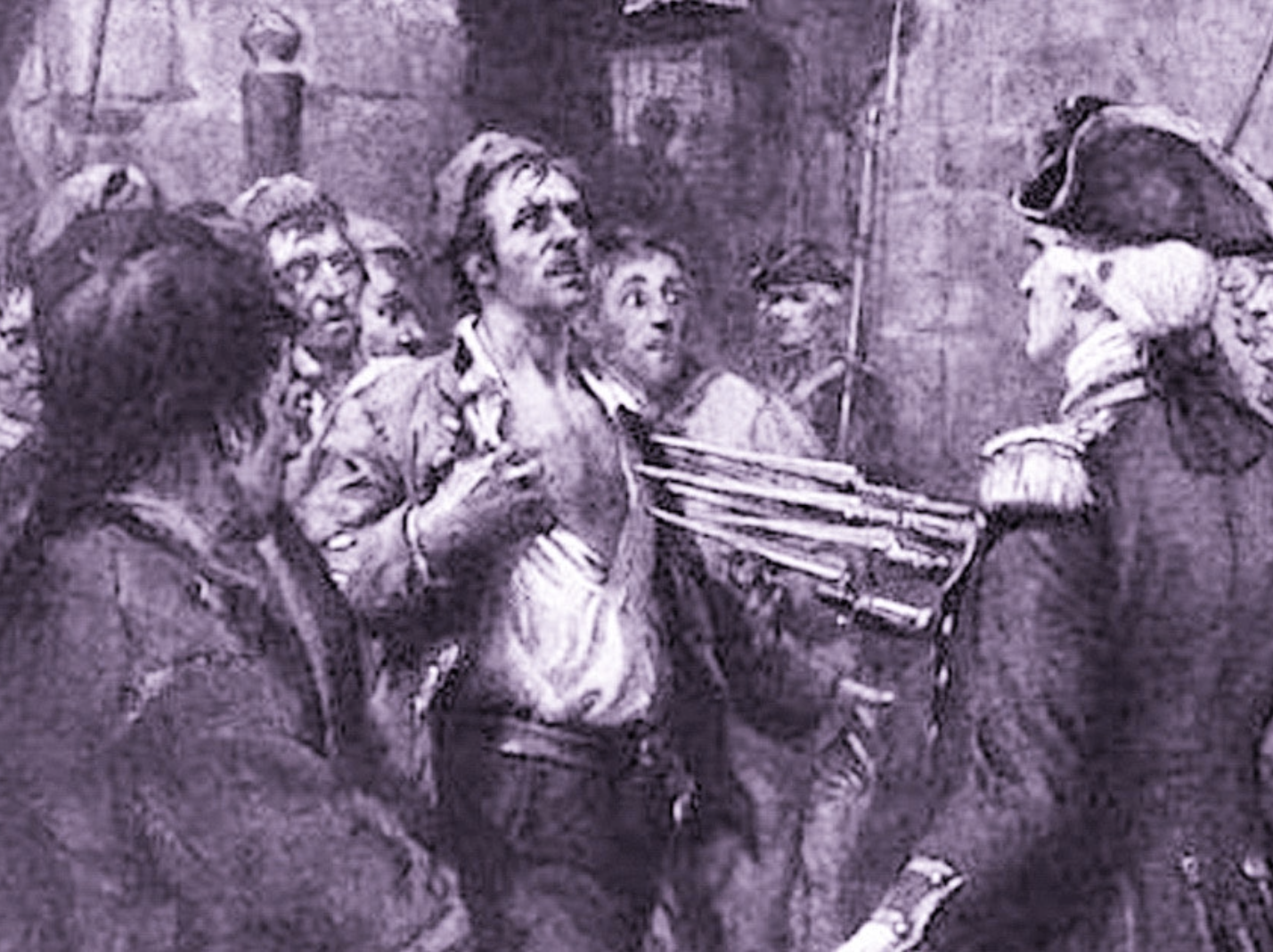
On September 25, 1775, Ethan Allen was captured by the British outside Montreal, at the Battle of Longue-Pointe. He would spend several years held captive by the British—and, once released, write up his exploits to popular acclaim in A Narrative of Ethan Allen’s Captivity (1779). Some later historians, revisiting the battle, would conclude: Damfool blowhard Allen joined up on the American expedition to Montreal, wandered too close to the city with a handful of troops, got himself captured for his pains. Saith those historians: Allen, save for the moment of glory at Fort Ticonderoga, was always more a loud-mouthed bully-boy than the great hero he pretended to be.
Look closely at your legends, they’re always a bit more complicated than at first glance. Yah, Ethan Allen made his name first by torching barns of land surveyors from Albany, and anyone else from New York trying to dispute the rights granted by New Hampshire to Vermont lands—granted to New England farmers including Allen and his fellow Green Mountain Boys. Allen and the Green Mountain Boys weren’t killers, but they made it violently clear that New Yorkers weren’t welcome. When Allen and the Green Mountain Boys and tag-along Benedict Arnold went to capture Fort Ticonderoga back in May 1775—“[Surrender] In the name of the great Jehovah, and the Continental Congress!”—they were maybe rogues wrapping themselves in a handy flag. And Allen was a loudmouth and a good self-publicist, but maybe not the greatest tactician in the newborn United States of America. He got himself captured, after all. Of course, his mouth also got him out of British captivity in the end—the British were just as glad to exchange the half-mad—as they took him—unstoppably garrulous Vermonter for one of their own officers.
[RELATED: Freedom Is the Long Game]
Then there’s the rag-tag American invasion of Canada. A few hundred Americans all told, a few hundred more local Canadians joined up—some of them American farmers who’d moved north—fighting against the bare handfuls of British soldiers garrisoning the strings of forts along the St. Lawrence, the Canadian militia fighting for the British, the Britishers’ Indian allies. Motley forces on both sides, maybe 1,000-1,500 people at the most fighting on each side in the vast stretch of land from Montreal to Quebec City. The overall American commander at Montreal was an Ulsterman, Richard Montgomery, who’d left the British army, married a Livingston, and turned Patriot. Most of the local population up on the St. Lawrence was the conquered Canadiens, the defeated colonists of France abandoned to England at the end of the French and Indian War, figuring out whether they’d rather be ruled by the Anglais from across the ocean or the Anglais from Boston and New York. Par-dessus l’océan, as it turned out, but that wasn’t obvious when the Americans sent their armies north in 1775.
So few, fighting for so much land! Maybe Allen was a blowhard, but maybe he could have taken Montreal if the dice had fallen differently. Richard Montgomery did conquer it a few months later, before dying in the failed assault on Quebec City that put paid to America’s attempt to conquer Canada. Allen led a handful of half-trained men to conquer the great fortress of Fort Ticonderoga; why not thinly defended Montreal too? Daring can win great rewards—especially in the first days of a war, when the great masses of soldiery are still being recruited and trained, and a few men with pluck and rifles can seize the day.
But the dice fell as they did and Allen was captured. One moment of glorious heroism, the capture of Fort Ticonderoga, was all he would get.
Our revolution has its blowhards too—There’s tut-tut-tut and whatzizname and likewise you-know-who. The task of filling up the blanks I’d rather leave to you. And some of them will fail in misconceived battles, and others will write delusive memoirs of themselves as immortal heroes. Some will be small-time bullies, and some will be half-mad talkers.
[RELATED: The Crown Sees Rebellion]
And some will be all that, and still have their moment of glory, when they seize the fortress from the sleeping British and summon them to surrender, “In the name of the great Jehovah, and the Continental Congress!” Deserved glory. I’ve been using the language of the scoffers—damfool, blowhard, bully-boy, loud-mouth, rogue, self-publicist, half-mad, garrulous. But the scoffers miss the half of the story that matters. We humans, we Americans, we’re a fallible bunch. But Ethan Allen risked his life for American liberty, and he won a glorious victory for the American Revolution at Fort Ticonderoga. Perhaps an essential one: the cannon that Ethan Allen seized at Fort Ticonderoga would be the cannon that drove the British out of Boston the next summer. And Ethan Allen suffered for American liberty: he spent years of his life in British prisons, including far too long in the foul hulks, where many American prisoners would die of disease. Mocking Ethan Allen only takes you so far. Foibles and all, he was an American hero.
So too are those who fight now for American liberty, even the ones who embellish their deeds to make a better story. And foolish, muddled Americans that they are, they will deserve their glory and their legend.
Follow David Randall on X, and for more articles on the American Revolution, see our series here.
Art by Beck & Stone